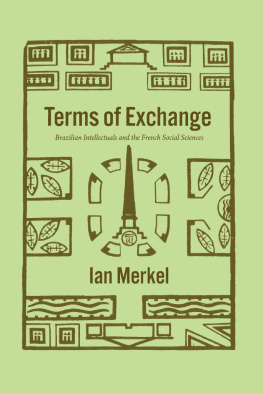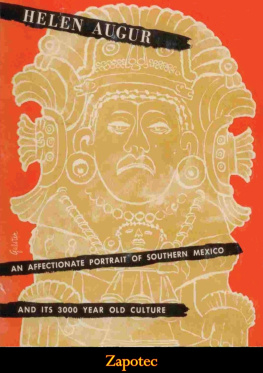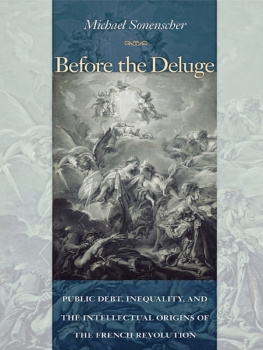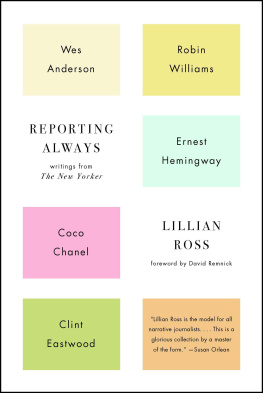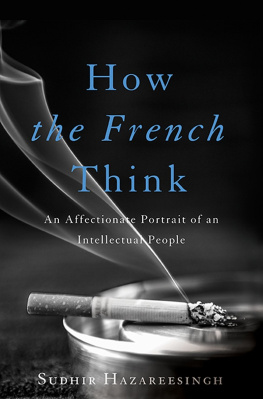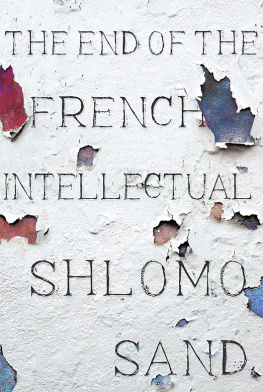Hazareesingh - How the French Think : An Affectionate Portrait of an Intellectual People (9780465061662)
Here you can read online Hazareesingh - How the French Think : An Affectionate Portrait of an Intellectual People (9780465061662) full text of the book (entire story) in english for free. Download pdf and epub, get meaning, cover and reviews about this ebook. City: Array, year: 2015, publisher: Perseus Book Group;Basic Books, genre: Religion. Description of the work, (preface) as well as reviews are available. Best literature library LitArk.com created for fans of good reading and offers a wide selection of genres:
Romance novel
Science fiction
Adventure
Detective
Science
History
Home and family
Prose
Art
Politics
Computer
Non-fiction
Religion
Business
Children
Humor
Choose a favorite category and find really read worthwhile books. Enjoy immersion in the world of imagination, feel the emotions of the characters or learn something new for yourself, make an fascinating discovery.

- Book:How the French Think : An Affectionate Portrait of an Intellectual People (9780465061662)
- Author:
- Publisher:Perseus Book Group;Basic Books
- Genre:
- Year:2015
- City:Array
- Rating:4 / 5
- Favourites:Add to favourites
- Your mark:
- 80
- 1
- 2
- 3
- 4
- 5
How the French Think : An Affectionate Portrait of an Intellectual People (9780465061662): summary, description and annotation
We offer to read an annotation, description, summary or preface (depends on what the author of the book "How the French Think : An Affectionate Portrait of an Intellectual People (9780465061662)" wrote himself). If you haven't found the necessary information about the book — write in the comments, we will try to find it.
Hazareesingh: author's other books
Who wrote How the French Think : An Affectionate Portrait of an Intellectual People (9780465061662)? Find out the surname, the name of the author of the book and a list of all author's works by series.
How the French Think : An Affectionate Portrait of an Intellectual People (9780465061662) — read online for free the complete book (whole text) full work
Below is the text of the book, divided by pages. System saving the place of the last page read, allows you to conveniently read the book "How the French Think : An Affectionate Portrait of an Intellectual People (9780465061662)" online for free, without having to search again every time where you left off. Put a bookmark, and you can go to the page where you finished reading at any time.
Font size:
Interval:
Bookmark:
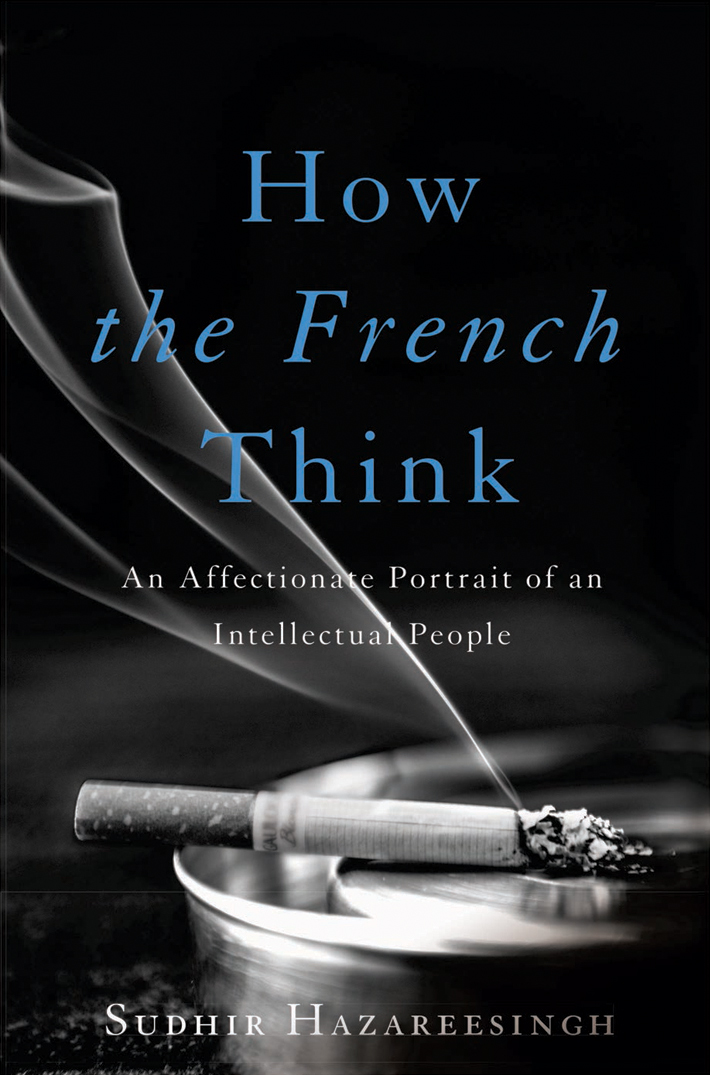


Copyright 2015 by Sudhir Hazareesingh
Published by Basic Books
A Member of the Perseus Books Group
All rights reserved. Printed in the United States of America. No part of this book may be reproduced in any manner whatsoever without written permission except in the case of brief quotations embodied in critical articles and reviews. For information, address Basic Books, 250 West 57th Street, New York, NY 10107.
Books published by Basic Books are available at special discounts for bulk purchases in the United States by corporations, institutions, and other organizations. For more information, please contact the Special Markets Department at the Perseus Books Group, 2300 Chestnut Street, Suite 200, Philadelphia, PA 19103, or call (800) 810-4145, ext. 5000, or e-mail .
Designed by Jeff Williams
Library of Congress Cataloging-in-Publication Data
Hazareesingh, Sudhir.
How the French think: an affectionate portrait of an intellectual people / Sudhir Hazareesingh.
pages cm
Includes bibliographical references and index.
ISBN 978-0-465-06166-2 (e-book)
1. Philosophy, French. 2. FranceIntellectual life. I. Title.
B1801.H39 2015
194dc23
2015022738
10 9 8 7 6 5 4 3 2 1
For Karma, who makes everything beautiful
CONTENTS
I began observing French public life as an adolescent in my native island of Mauritius in the 1970s, when I was drawn to the countrys culture, history, and politics by a variety of influences. First, my secondary school, the Royal College Curepipe, where we were served a copious diet of French classics, from Molire and Racine to Saint-Exupry, Gide, hell is other people Sartre, and the inevitable (and already somewhat irksome) Camus. The family setting was essential, too, notably because of my father, Kissoonsingh, a Cambridge-and Sorbonne-trained historian who worked as principal private secretary to the prime minister of Mauritius, Sir Seewoosagur Ramgoolam. He cultivated close ties with politico-literary elites in France and Africa, in particular the Gaullist writer and Frances first minister of culture Andr Malraux and the Senegalese president Lopold Sdar Senghor. Another inspiring figure was my brother, Sandip, a devotee of Napoleonic history, thanks to whom I plunged with relish into all aspects of the emperors legend.
There was also the French cultural attach in Mauritius, Antoine Colonna, a close friend of the family who was a native of Corsica (and thus a living link with the mythical birthplace of the emperor). Antoine provided us with subscriptions to French weekly periodicals such as Le Nouvel Observateur, Le Point, and LExpress, enabling me to remain closely attuned to French political and intellectual life. The French like to divide things into two, and the bifurcation of the time was between those who gathered around the liberal president, Valry Giscard dEstaing, and those who favored the left-wing parties of the Union de la Gauche. My sympathies were very much with the latter, especially with the Stalinist French communists, whose valiant past and unrelenting dogmatism appealed to my adolescent sensibility. I absorbed the writings of communist economists on the noxiousness of state monopoly capitalism, devoured the poems of Louis Aragon and Paul luard, and idolized communist martyrs and heroes such as Gabriel Pri, the antifascist campaigner who was executed by the Nazis at the Mont-Valrien fortress in 1941, and the Resistance leader Henri Rol-Tanguy, who launched the insurrection against the occupying forces in Paris in August 1944 from his underground bunker in Denfert-Rochereau. Yet I remember reading Giscards pamphlet Dmocratie franaise with quiet fascination; indeed, I could not help admiring its clinical elegance and programmatic ambition.
Just as vital in nurturing my Francophilia were television shows such as Bernard Pivots Apostrophes, which introduced me to the contemporary French literary scene and allowed me to savor its delicately rarefied atmosphere. I vividly recall a discussion between Pivot and the writer Marguerite Yourcenar in 1979 about whether good and evil were necessary. The exchanges were not particularly profound or conclusive. But it all sounded wonderful. Even though there was something slightly comical about all this preciosity, especially when viewed from the hazy distance of a little tropical island in the Indian Ocean, no one else at the time could rival the French in terms of sheer intellectual energy and panachenot the United States, still mired in its post-Vietnam maelstrom, and especially not Britain, with its industrial strife, shambling public finances, and bitterly factionalized Labour Party. In hindsight, my lifelong passion for the politics and history of France was clearly a product of those heady years.
Since the early 1990s, while teaching at Oxford, I have also lived in Paris for part of the year, and I associate with a variety of intellectual communities, from those within institutions of higher education and the editorial boards of journals and publishing houses to research networks, literary juries, and historical associations. These sustained interactions grant me an excellent vantage point from which to observe French thinking in all its glories, complexities, and idiosyncrasies. I thus came to realize that French traditions of thought are translated into concrete ways of life in which ideals and values are affirmed through social, cultural, and academic ritualsfestivals, anniversary celebrations, rentres littraires, demonstrations, marches, petitions, even doctoral examinations. The intimate connection between thought, practice, and performance is vividly brought home to me whenever I am invited to serve on a doctoral jury in France and observe the magnificent rhetorical style of my French colleagues.
My deeper immersion in the intellectual life of France has impressed upon me the powerful influence of literature in both reflecting and shaping the nations mindsetone of the striking features of French culture. Voltaires Candide and Rousseaus Nouvelle Hlose (The New Hlose) were essential vehicles for disseminating Enlightenment ideals of autonomy and authenticity, just as in the nineteenth century Alexandre Dumass novels gave the French people more of an impression of their royalist past than all the historians of the age. More recently, there are few more illuminating pathways into the complex experiences of occupation, resistance, and collaboration in France between 1940 and 1944 than Joseph Kessels Army of Shadows, Vercorss Silence of the Sea, and Louis-Ferdinand Clines Castle to Castle. These literary works underscore, too, some of the key (and admirable) elements of the French spirit: a willful predisposition to deviate from the beaten path, a cult of sentiment and mystery, and a resistance to all conformism.
The principal aim of this book is to identify the cultural distinctiveness of French thinkinga cosmology that is as much a matter of content as of temperament, style, and idiom. As we shall see, French thought is pervaded by religious concepts, images, and metaphors. Though secular in its public institutions and the collective beliefs and practices of its people, France continues to live under the shadow of its once-dominant Catholicism. I was already aware of this in Mauritius in the 1970s when I began to immerse myself in French political and intellectual culture: good and evil were not only subjects of literary and philosophical discussion but also concepts that were regularly used in political intercourse. Indeed, one of the classic works I first encountered, toward the end of the decade, was Alain Peyrefittes
Font size:
Interval:
Bookmark:
Similar books «How the French Think : An Affectionate Portrait of an Intellectual People (9780465061662)»
Look at similar books to How the French Think : An Affectionate Portrait of an Intellectual People (9780465061662). We have selected literature similar in name and meaning in the hope of providing readers with more options to find new, interesting, not yet read works.
Discussion, reviews of the book How the French Think : An Affectionate Portrait of an Intellectual People (9780465061662) and just readers' own opinions. Leave your comments, write what you think about the work, its meaning or the main characters. Specify what exactly you liked and what you didn't like, and why you think so.

